#acuedu_p
Text
Introduction and Purpose
The main purpose of why I created this educational blog was to allow me as a primary education student to effectively engage with technology as well as to develop the skills that I needed in order to engage my students within the classroom environment. I also created this blog so that I can interact with other educators, so that I can improve on my teaching practice and critical thinking as well as knowledge. The following quote by Jenny Arledge is one that I believe is important and true about integrating modern technology into education in today society; she says that " Technology can become the "wings" that will allow the educational world to fly farther and faster than ever before - if we will allow it".
Technology has had a massive impact within education and it is changing our world. The way that kids now learn has most certainly changed from the pen and paper era to the world of Ipads and computers. Through my experience of working with children in classroom settings, the way that they critically evaluate and reflect on their work has truly surprised me. Throughout this creative and educational blog, I will have several critical reflections that will reflect on particular driving questions as well as the content that I have learnt from my tutors and lecturer in this course. It will also show the research that I have done about these questions. All of my work ( blog posts as well as this blog ) are all my own work, except where appropriately referenced.
1 note
·
View note
Text
An Understanding of How Changes In Technology Impact On The Way Humans Communicate, And The Ethical Issues That Surround These Changes
In 2017 it is common for most people to come into contact with a digital device in their everyday life. People of the 21st century now rely on devices such as laptops, mobiles, and televisions day to day and have because autonomous to it. Always wanting the most up to date and fastest model of these devices it makes you really think of what are the ethical issues that surround these changes.
There are many concerns around these technologies whether it be social issues where people are so attached to their phones that without this device it may cause anxiety and even have sleeping issues due to being addicted to scrolling through their phone or the constant dependence on our mobile phones to solve all our problems rather than thinking for ourselves. (B.Wuensch, 2015)
Another issue surrounding the changes of technology is online bullying. People especially youths are now anonymous online and can create fake personas to torment others online. It is easier for others to bully somebody online as it is only a click of the button, there is no confrontation which makes the culprit feel like there is no wrong done. Bullying is not ethical and the victim often feels helpless and like there is no escape. With the changes in technology, it makes this faceless crime easier. (R.Vitelli, 2016)
There have been many positive impacts within technology but with the constant development, we have become so involved with the technologies that we have started to isolate ourselves, rather than living in the present moment we are sitting on our phones. These digital devices which were created to bring us together are now isolating us. (B.Wuensch, 2015)
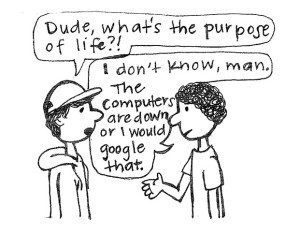
APA referencing and link:
Wuensch, Brianna (2015) 10 ways technology has negatively affected society. Retrieved https://www.theodysseyonline.com/10-ways-technology-negatively-affected-society
Vitelli, Romeo (2015) Does technology make bullying easier? Retrieved https://www.psychologytoday.com/blog/media-spotlight/201604/does-technology-make-bullying-easier
Image retrieved from http://sites.jmu.edu/gumniorfall131/how-much-technology-is-too-much/
5 notes
·
View notes
Photo
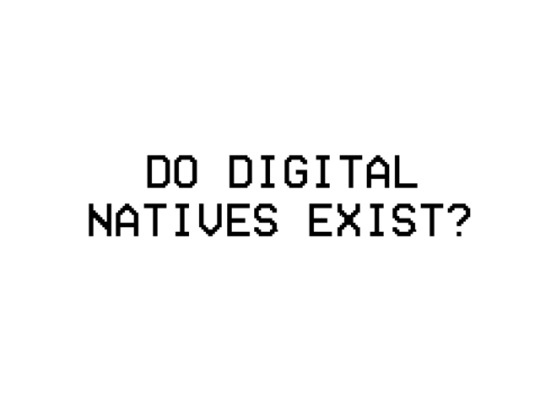
Do digital natives exist?
A digital native can be simply defined as someone who is unfamiliar with periods of time without digital technology, such as computers and the Internet. Revision of articles written by individuals, such as American writer and public speaker, Marc Prensky, establishes this understanding of the theory of who and what digital natives are, as well as ‘digital immigrants’ who adapted the age of digital technology later in their lives (Prensky, 2001).
Whilst there are individuals who do not believe in the idea of digital natives, I personally believe that the concept of ‘digital natives’ has a lot of evidence constructed by theorists like Prensky, who attempt to understand the changes that may need to be undertaken to be able to adapt education to the needs of newer generations (Gu, Zhu & Guo, 2011).
But what evidence has persuaded me enough to encourage me to agree with these scholars? The idea that there are individuals who find it difficult to relate and understand those who are technology savvy lead me to believe that this concept of digital natives is in fact true, and it can often seem as though these individuals have a different sense of communication and language to older generations. The way in which digital natives learn and receive information, as well as their preferences of digital media, is proven different to digital immigrants (Vercic & Vercic, 2013). However, although all digital natives are classified under the same term, those from different time periods are in fact quite different to each other. For instance, a digital native from 2001, when compared to a 2016 digital native, have both had different experiences with digital technology and therefore are more adapted to the form of media more prevalent within their own age. Finally, modifications made in schools, such as introduction of tablets in learning, demonstrates the differences in development between different digital natives, in which individuals have been allowed to flourish in a more modern sense.
Reference List:
Vercic, A T., & Vercic D. (2013). Digital natives and social media. Retrieved from http://www.sciencedirect.com/science/article/pii/S0363811113001215?via%3Dihub
Gu, X., Zhu, Y., & Guo, X. (2013). Meeting the “Digital Natives”: Understanding the Accepting of Technology in Classrooms. Retrieved from http://www.sciencedirect.com/science/article/pii/S0363811113001215?via%3Dihub
Prenksy, M. (2001). Digital Natives, Digital Immigrants. Retrieved from http://www.marcprensky.com/writing/Prensky%20-%20Digital%20Natives,%20Digital%20Immigrants%20-%20Part1.pdf
3 notes
·
View notes
Text
How changes in technology impact on the way humans communicate and the ethical issues that surround these changes?
Hello and welcome to the 3rd blog post of today’s topic. Today’s topic is: How changes in technology impact on the way humans communicate, and the ethical issues that surround these changes.
In today’s modern society where we live in the 20th century, most of our work gets done through using modern technologies such as laptops, tablets, phones and even perhaps on computers based on the Internet. With the use of new technologies, it can somehow have many effects on our live. One example of this would be the ways we communicate to our friends and families. One of the ways that technologies has effected on our daily lives are:
- The use of websites: using websites are one of the ways people can connect nowadays. Nearly the whole world population uses websites to connect with others and to read articles online. Going to websites, one of the ethical issues that surround this is that it prevents people from going out and seeing someone via face-to-face. With the existence of the new technologies, it makes us and everyone else’s lives easier. This is because of all the information we need is easier to find and access instead of having to wait amount of weeks for the newspapers to be published. Everything nowadays is based using online.
- The use of Phones: I think using phones allows people and everyone’s lives easier. Using phones is also another way to communicate with people on phone rather than seeing someone in person and talking with each other. One ethical issue behind this is that it can prevent people from communicating with each other. Using phones allows us to interact with our family members and friends and it is way to use speech language. The good side to using a phone is that it saves time and it is much easier to find and connect with others.
- Social networking: One of another ways that people use to connect and communicate with each other is through the use of social networks. Nowadays, in the young generation as high as age 18 and above should at least have 1 social network account. Whether it is Facebook, Twitter, Instagram, Snapchat, Google etc. Dating back in the centuries, a lot of communication was evolved through using different types of communication. That being said, it was also by far simple and intimate until later in the years, technology has changed the way how we connect, communicate, find love, search results (WiseLife, 2015).
The next part that will be mentioned is the ethical issues that these changes. What does ethics really mean when we talk about technology. Ethics is about rules and regulations, it is about values, doing bit of research, it also have moral principles that you can apply to, as well as ethical practices and rules of conduct. (Personal communication, September 1, 2017). The ethical thinking is based on The Universal Declaration of Human Rights (UDHR) (Personal communication, September 1, 2017). There are some of the ethical issues that can be noted are:
- Moral choices by the individuals in relation to their community
- Rules of governing members of a profession
- Standards of acceptable behaviour (Bayers, 2013)
Copyright and Intellectual Property: In this area, some confusions were made majority of the time by many people. This has been caused in regards to copyright and intellectual property rights. It is also how they apply to electronic files within new technologies. (Bayers, 2013)
The next ethical issue that can be found is Fair Use: What does Fair Use mean? According to the dictionary, it means ‘(in US copyright law) the doctrine that brief excerpts of copyright material may, under certain circumstances, be quoted verbatim for purposes such as criticism, news reporting, teaching, and research, without the need for permission from or payment to the copyright holder: whether or not six seconds of the song in a user-generated video constitutes fair use is something for a court to decide.’ In fair simple words, Fair Use is a critical to protect the intellectual property. In this ethical issue, it includes individual uses of copyrighted works and the development of new speech technologies. One of the issue in Fair Use is that one may make fair use of the copyrighted work without asking permission from the copyright holder. This is determined through using the copyrighted work which is within fair use depends upon four fair use factors. (Bayers, 2013).
The 3rd ethical issue is privacy policies, what is privacy policies?
- it is a statement or a legal document that disclose some or all of the ways a party gathers, uses, discloses, and manages a customer or client’s data.
Such as laws, policies and technological design, which is increasingly structuring people’s relationships whether it’s through social institutions or individual privacy that faces new threats and as well as opportunities. (Bayers, 2013). In addition to the idea of Privacy Policies, it is included with Electronic bulletin Board, OoVoo and Pocket.
There may be many more ethical issues that considered but as mentioned above are the most critical things that has happened in reality when it comes to technology.
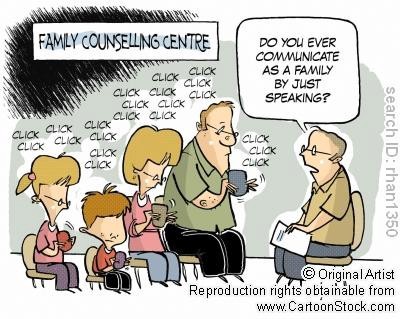

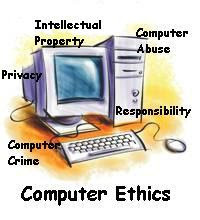
References:
WiseLife. (2015, March 15). The Evolution of Modern Technology [Video file]. Retrieved from https://www.youtube.com/watch?v=oKQ03sr6ryo
Darryl Jelley (2015, March 8).PROVIZORCA How New Technology Changes the Way We Communicate [Video file]. Retrieved from
https://www.youtube.com/watch?v=PrAHhyIoXck
Cathie Bayers. (2015, August 21). Legal and Ethical Issues and Modern Technologies [Video file]. Retrieved from https://www.youtube.com/watch?v=qbAXOmuqgew
Statement of Academic Honesty and screenshot
All work contained in this blog is my own except for where it is applicable and appropriate referenced. This includes ideas, opinion and images.
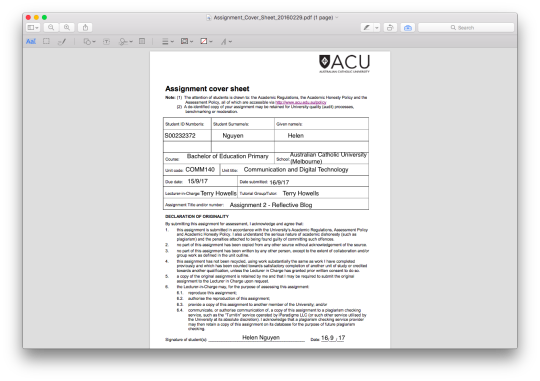
3 notes
·
View notes
Text
Blog Post 1: The Rewrite!
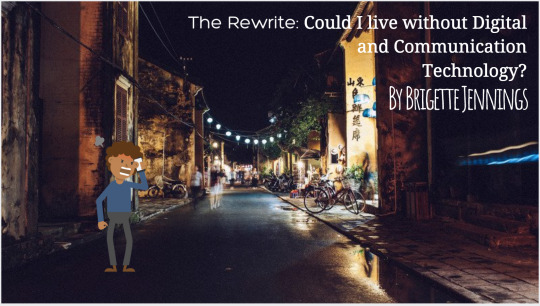
Could I live without Digital and Communication Technologies?
In this week’s blog post I will be discussing the week 1 driving question, about whether or not I believe I could live without Digital and Communication Technologies. Throughout the lecture and tutorial for week 1, we mainly had an introduction to the course, learnt about what the assignments will be, and what is expected of us as students in completing the course. However, in the tutorial we were asked to ponder the question “could you live without digital and communication technologies?”
Before I start saying more on the topic, I feel like it would be useful to specify what “digital and communication technologies” really means. My tutorial class defined it as multiple things, the ones that stood out being; a way to communicate with people from all around the world, an online community, and pieces of technology that are used in our day to day lives.
During this class we learnt about the phrase “Digital Natives” (Prensky, 2001) and what it means. Prensky defines it as people, especially students, who have “spent their entire lives surrounded by and using computers, videogames, digital music players, video cams, cell phones, and all other toys and tools of the digital age” (2001). Most of the class realised that we would fall into this category, myself included. I know personally, that although I have always done lots of sport and had younger sisters to play with for most of my life, my family has always had a TV, a phone and even one of those huge box-like computers that my sisters and I could never quite figure out. Although most people were certain that they would be able to live without digital and communication technologies, the more we discussed it and thought about it, the more we realised how often we really use technology in our day to day lives. This realisation has made me think about whether or not I would actually be able to live without digital and communication technologies if, in fact, I have never known a world without it. And although I would like to think that I would be able to survive easily, the reality is, I would not.
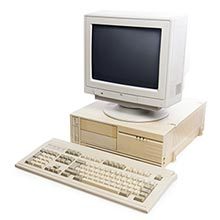
Until next time,
Brigette
References:
Marc Prensky, (2001) "Digital Natives, Digital Immigrants Part 1", On the Horizon, Vol. 9 Issue: 5, pp.1-6, https:// doi.org/10.1108/10748120110424816
0 notes
Text
RE-WRITTEN BOG POST
For our last blog post in unit Comm140, our blog post were to be assessed by our peers with written feedback. From this feedback, we would then have to re-write our post to improve the quality with as much reference to the feedback that was provided.
The blogger that provided me with feedback was:
Jack O’Neill... you can view his blog on https://comm14000.tumblr.com/
FEEDBACK on Blog Post 1 - Is there more to online games than fun?
Perhaps personal anecdotes that weren’t related to the Comm140 task that “Marcusfromcomm140” would have been of better use in a blog that is available for everyone to see, as this would have made the anecdote easier to relate to. Not everyone is doing a Bachelor of Education (Primary). “Marcusfromcomm140” however was successful in stating what makes a game fun, such as “needs to intrigue the user”, creating a “drive of wanting to complete it to the best of your ability” and “it needs to be challenging”. Also by gathering statistics from websites to support “Online gaming is an intensely social phenomenon, with millions of young adults and children around the globe interacting constantly” would have further improved the quality of this blog post.
Re-Written Blog Post
Well this is an easy question, with an easy answer… YES! Of course, the first thing that I think of an online game is that I am immediately drawn to the fact that it has to be fun, however that is not all an online game is. For example for my university course I am asked to create an online game in groups for children aged 7 -11, and whilst making this game I am realizing more and more about all the other relevant factors to making a successful online game. So apart from making it fun, it is crucial that a game must have an objective or a goal that users try to reach in order to complete the game, therefore not only must it be fun, it needs to be challenging. A successful game needs to intrigue the user into being determined to want to finish it… that is what makes a game addictive, that drive of wanting to complete it to the best of your ability and better than everyone else. Along with making an online game challenging, to ensure a successful game it must have a great story, as well as the games artwork being vibrant. With reference to “What Makes a Great Game?” by plural sight A successful online games needs to enforce users to become addicted to it, and in order to do that, not only must game be challenging but it need to look and sound attractive to draw people into it. You can view this article here on https://www.pluralsight.com/blog/film-games/what-makes-a-great-game-the-key-elements-of-successful-games. I believe that online gaming is an intensely social phenomenon, with millions of young adults and children around the globe interacting constantly, to not only play and have fun, but also to share information, challenge themselves and to interact to everyone around the world.
0 notes
Text
How Changes In Technology Impact On The Way Humans Communicate, And The Ethical Issues Surrounding These Changes (Rewrite)
There is no doubt that advances in technology have made a significant impact in altering our lives. Possibly many of us have come to find ourselves feeling like we cannot exist without technology. I do not totally condemn the effect of technology it has had on the world because technology has allowed us to do wonderful things we possibly didn’t think we could do years before.
The quality of face-to-face communication is suffering because of these gadgets that intercede our lives every day. Keller (2013) writes that according to Paul Booth, an assistant professor of media and cinema studies, social media has caused a “shift in the way we communicate; rather than face-to-face interaction, we’re tending to prefer mediated communication.” You will see that our children and youth of today, are embedded into their gadgets. Dr. Brent Conrad, a clinical Psychologist for TechAddiction, states that “72% of children have access to a computer at home” (2017). Their lives revolve and rely so highly on technology. The creation and effect of social media has opened a door for hackers, cyberbullying, mental and psychological issues, lack of privacy and other negative effects that are concerning and detrimental. Campbell (2017) states that research by two health organisations shows that, “poll of 14 to 24 year olds shows Instagram, Facebook, Snapchat and Twitter increased feelings of inadequacy and anxiety.” The youths health and well being is badly affected and is a problem that everyone needs to identify in order to help each other.
So let’s turn the leaf and recognise the beauty of the advanced technologies. Without technology, we would have no access to transportation, telephones, water and electricity that ultimately play a massive role in our lives. It’s improved on our education system where it has been embedded to improve student’s learning process and more visually fun. Technology has allowed amazing improvements in health care, as health care professionals are able to perform things that would have never been possible to do before. It keeps us and the world around us so involved and in touch, we even manage to see our family and friends who are half way across the world virtually through a screen. It allows us express ourselves in ways we probably never would have imagined.
Although there are negative impacts that technology has made, we cannot forget the better part in which the advances of technology has impacted our lives greatly better. It has allowed for different modes of communication and has opened the world of social media where we gain the freedom to express ourselves and brings unity to the world. It has made an amazing influential on our upbringing; we cannot deny the beautiful changes it has made on the human beings of today.
References
Campbell, Dennis. (2017). Facebook and Twitter Harm Young People’s Mental Health. Retrieved from
https://www.theguardian.com/society/2017/may/19/popular-social-media-sites-harm-young-peoples-mental-health
Conrad, Dr. Brent. (2017). Children and Technology – Stats for Technology in the Home. Retrieved from
http://techaddiction.ca/children-and-technology.html
Kelly, Maura. (2013). Social Media and Interpersonal Communication. Retrieved from
http://www.socialworktoday.com/archive/051313p10.shtml
Screenshot of the feedback from Wendy Luu
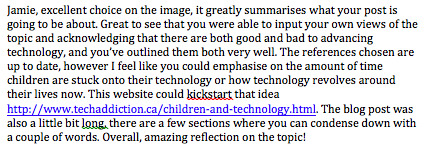
Copy of original critical reflection
There is no doubt that advances in technology have made a significant impact on the way we, as a society, communicate with each other and has altered all of our lives. Possibly many of us have come to find ourselves feeling like we cannot exist without technology. I do not totally condemn the effect of technology it has had on the world because throughout all these years, technology has allowed us humans to do wonderful things we possibly didn’t think we could do years before.
Technology and the digital world have never been more influential towards our lives. The advances of technology have allowed communicating much easier than it was before. Say goodbye to sendings letters, writing with a pencil or even reading the newspapers! I am sure we all have these hand sized screens in our pockets that can do the job! But let’s not get carried away and remember that there is also a downfall in that. Keller (2013) writes in her article that according to Paul Booth who is an assistant professor of media and cinema studies, social media has caused a “shift in the way we communicate; rather than face-to-face interaction, we’re tending to prefer mediated communication.” The quality of face-to-face communication is suffering because of these gadgets that intercede our lives every day. We have become so attached to our mobile phones, laptops or game consoles, we always feel the need to interact and accustom with them so we don’t miss a thing happening in the digital world. I cannot even begin to fathom the creation of social media and the effect it has made on human beings. It has opened a massive door for hackers, cyberbullying, mental and psychological issues, lack of privacy and other negative effects that are concerning and detrimental, especially of the youth in this day and age. Campbell (2017) states that according to research by two health organisations, “poll of 14- to 24-year-olds shows Instagram, Facebook, Snapchat and Twitter increased feelings of inadequacy and anxiety.” The youths health and well being is badly affected and is a problem that everyone needs to identify in order to help and support them, as well as each other. There are implications with the development of technology and the ethical issues that arise with it, but we definitely cannot forget the beauty of technology and the wonders it has offered for us in this world.
So let’s turn the leaf and recognise the beauty of the advanced technologies. Sometimes we tend to forget that technology actually plays a big part in as simple as living. Without technology, we would have no access to transportation, telephones, water and electricity that ultimately play a massive role in our every day lives. The development of technologies has made a great influence on our cultures, and how they are so imbedded into our health care and education. It’s improved on our education system and student’s learning process where it has been embedded to improve student’s education and make learning more visually fun. Technology has allowed amazing improvements especially in the health care aspect as health care professionals are given chances to perform things that would have never been possible to do before. It keeps us and the world around us so involved and in touch, we even manage to see our family and friends who are half way across the world virtually through a screen. It allows us express ourselves in ways we probably never would have imagined. We have to thank Facebook, Twitter, Instagram, Snapchat, Skype and other social media platforms for that (especially the amazing Google!)
Although there are numerous negative impacts in which technology has had on our society that we cannot ignore, we cannot forget the better part in which the advances of technology has made our lives greatly better. It has allowed for different modes of communication with each other and has opened the world of social media where we gain the freedom to express ourselves and keep in touch with each other. It brings unity to the world where we can overcome any barriers and it has made an amazing influential on our upbringing; we cannot deny the beautiful changes it has made on the human beings of today.
References
Campbell, Dennis. (2017). Facebook and Twitter Harm Young People’s Mental Health. Retrieved from
https://www.theguardian.com/society/2017/may/19/popular-social-media-sites-harm-young-peoples-mental-health
Kelly, Maura. (2013). Social Media and Interpersonal Communication. Retrieved from
http://www.socialworktoday.com/archive/051313p10.shtml
0 notes
Photo

Year 5 are doing an election this term and as part of their advertising material these students are making giant origami frogs! #acuedu_p https://t.co/UvvpPx9smx https://www.youtube.com/c/lifesang
0 notes
Text
RT @MissRJacobs: Made this for developing numeral ID skills #ACUedu_p https://t.co/t5iXvrjCns
Made this for developing numeral ID skills #ACUedu_p pic.twitter.com/t5iXvrjCns
— Rachel Jacobs (@MissRJacobs) July 15, 2017
0 notes
Text
Week 1- Twitter Setup.
What is the new Technologies Curriculum all about?
The new Technologies Curriculum is all about students engaging with technology as a learning tool. Technology makes teaching and learning, meaningful and fun. #ACUedu_p
Link to my Twitter: https://twitter.com/zarahjscott
0 notes
Photo

Feedback given by me on Brianna Cust’s article:
Brianna Cust’s blog post on the impact of changes in technology and ethical issues has evidently shown her research and personal understanding in a clear manner. Brianna was able to address the idea that change in technology has impacted human being’s ability to communicate and gave simple examples of these, however, more information could have been added to her piece to make this clearer. Brianna gave sufficient examples of ethical issues, although she could have spoken about what attempts have been made to overcome them. Revision of the argument is recommended, as minor grammar errors made certain areas less cohesive and prevented a smooth flowing writing. Overall, Brianna’s argument was an interesting and appealing piece which allowed me to understand her views on technology and ethical issues.
Feedback given by me on Truong-Xinh Nguyen’s article:
Truong-Xinh Nguyen’s writing on ‘Do digital natives exist?’ was an informative and interesting piece which focused on the studies of Marc Prensky. Truong-Xinh’s blog provided good evidence but was often confusing as it was not clearly linked back to the topic. Although the information provided within the post was engaging and had an abundance of interesting ideas, it was not clear whether these were Truong-Xinh’s personal opinions, as it was not written in the first person as most reflective blogs usually are. To create a more coherent piece, rewording and re-reading are recommended. Overall, Truong-Xinh argument was an enjoyable read.
0 notes
Text
Why do I need to become a Reflective practitioner? (Rewritten version)
When talking about reflection, sometimes people tend to get the wrong idea or meaning of what the term ‘reflecting’ is about. The idea of reflecting is all about looking back on something as such as looking back into the past whether it is a good or a bad impression. It also includes thinking about it and it also require thinking deeply. When people ask, ‘What is reflecting?’ Reflecting is based on a person that is thinking deeply about something which then leads to identifying issues. it also allows people to question their own opinions and thoughts which may be associated with it. Not only just that, it also combines the information that we have and apply through our learning. When reflecting on something, I believe that there is a process that we can follow based on reflective thinking. It is something that we can undertake when we as human beings reflect on something or reflecting on our past events. Sometimes, we don’t take notice of what is going around us.

One of the 4 main steps that I have learnt In COMM140, in week 4 lecture slides at The Australian Catholic University (ACU, 2016), the idea of reflection sums up the 4 main steps. One of them are: 1) Self Awareness 2) Critical Analysis 3) Synthesis and 4) Evaluation.
The first step in reflection is Self Awareness. in Self Awareness, it allows to us to explore what our reactions were. While in Critical Analysis, this is when we start to question ourselves by asking these questions with: “Why? How? or What if...?” By asking these questions will allow us to explore these feelings at a deeper thought. The third step is Synthesis. In this step, it allows us to connect the new knowledge and the significance that we have to our initial reactions. The last step is Evaluation. Evaluation is all about evaluating on what you have learnt and it is about seeing what comes next.
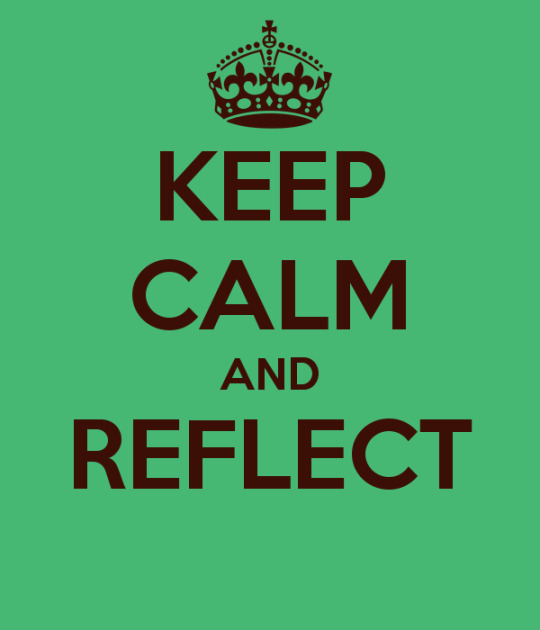
In my opinion, when it comes to reflection, the way how the language is used allows to reflect on something The three mains that examine the idea of reflection are: Affective responses, cognitive responses and behavioural. In other words, it is the language to attitude, emotion, and evaluation. (Personal communication, August 21, 2017). I believe that the language people use in their reflection in their everyday lives can be quite different as to how the essay or an essay response is written. One example of this is that I have used is First person among with few descriptive terms. The language I have also used is causal. If I use this same topic question but in an essay form, it would require similar information with some examples and evidence. Although, if it was in an essay response, it would not be in first person and it would not be casual. Instead, it would be more informative.
Overall, the main idea of this blog post is: Why do I need to become a reflective practitioner? The answer is, if i want to be the teacher that i want to be, i have to constantly reflect. This means that teachers will always have to reflect based on what kind of things that work well or what didn’t work well in the classroom area. Being a teacher means that they have to write down their goals in order to work progress towards them to ensure that their plans work well for next time and how they can make it better in order to get the best out of their children in their class.
Doing some reflection shows one of the main important things to do in reflective writing!
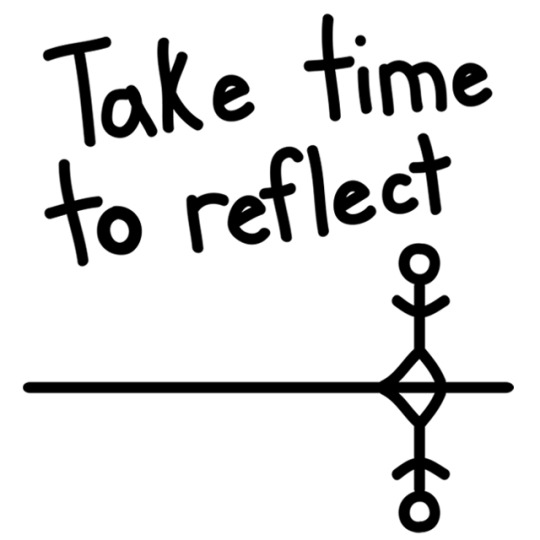
Reference:
Australian Catholic University. (2017). Week 4. Reflective Thinking. COMM140 Unit Materials. Retrieved August 21, 2017, from
https://leo.acu.edu.au/pluginfile.php/2435493/mod_resource/content/1/COMM104_ReflectiveThinking.pdf
Statement of Academic Honesty
All work contained in this blog is my own except for where it is applicable and appropriate referenced. This includes ideas, opinions and images.
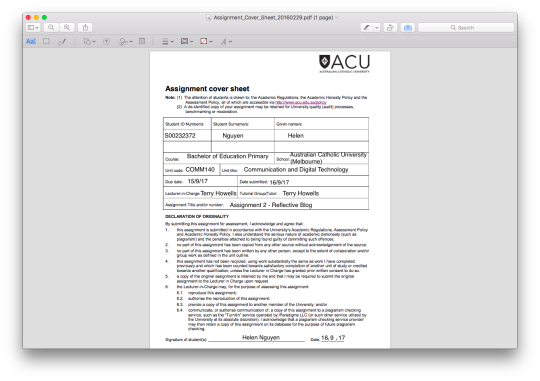
0 notes
Text
Blog 2 - Do I really need to become a reflective practitioner?
Welcome to my second blog post! This week’s question is “Do I really need to become a reflective practitioner?” Through this week we spoke about how and why we should become reflective practitioners. In the lecture we were told about the four levels of reflection; habitual action, understanding, reflection, and critical reflection (D. Kember, J. McKay, K. Sinclair, F. Kam Yuet Wong, 2008).
To be a reflective practitioner you must follow the process of reflective thinking. It involves self-awareness (the what), critical analysis (why, how, what if), synthesis (what is the significance for you, how does it change your ideas or give new insights), and evaluation (what does it mean for your future practice, what was learnt).
Initially, my opinion of this topic was that everyone should do this, however doing it to the extent that we were being told was a bit excessive. As I learnt more about this topic however, I realised that in order to get the best results, especially when I get to teach children in a classroom, I must be able to be a reflective practitioner and follow the steps we were taught in the lecture. By using these skills I will be able to address any problems that arise, before they become a bigger problem than they should be.
There are many ways to do reflective thinking, some of my personal favourites include: blogging, tweeting, mind maps, evaluations, and sometimes even drawing if I can’t find the words to describe something.
That’s all for this week, see you next time for some blogging fun!

References:
David Kember, Jan McKay, Kit Sinclair & Frances Kam Yuet Wong (2008) A four‐category scheme for coding and assessing the level of reflection in written work, Assessment & Evaluation in Higher Education, 33:4, 369-379, DOI: 10.1080/02602930701293355
0 notes
Text
Blog post 3: An understanding of how changes in technology impact on the way humans communicate, and the ethical issues that surround these changes
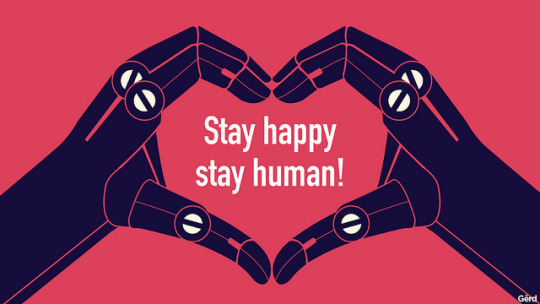
IMAGE by Flickr.com
Technology has widely impacted in the ways in which humans communicate today. Technology has opened up another world, ‘the Internet’ and with it we are all now able to communicate faster to one another. With the extraordinary development of technology we are now able to make voice calls, video calls, emails, messages, communicate on blogs, social pages such as Facebook and even share images.
Vijay Sharma (2017) highlights that with the technology, it has changed the way we go about our daily lives. He explains that “30 years ago people would have time for friends and families”, and due to the expansion of technology today we have become “busier than ever”. This is all because of the constant access and distractions from communication technologies through the Internet. Most people now are constantly checking emails, sharing what they eating for dinner, chatting up a new date for the evening, updating where they are, what they are wearing and catching up on friend’s events. We all seemed to be more detached from what is happening around us and concentration has moved to our technology devices.
Due to all these forms of sharing and communicating, major ethical issues have arisen, surrounding how we communicate with others and how we treat and respect each other’s online presence. The different communication technologies have exposed users to cyber bulling, aggressive language, images that may be confronting, verbal intimidation and online harassment. It is very important that what you write and communicate online is not harmful to anyone in anyway.
On a more positive note, if everyone is respectful, communication technologies have been a great success in that it has given people the opportunity to connect with others that may not have been possible without it. Be kind online...
Reference:
Sharma, V. (2018). ‘Top 12 Examples, How Technology Has Changed Our Lives. Retrieved September 15, 2018 from http://www.klientsolutech.com/examples-of-how-technology-has-changed-our-lives/
0 notes
Text
What are Digital and Communication technologies?
Digital and communications to me are basically any sort of communication transmitted through technology. Digital technologies on their own in my opinion are any sort of electronic tools, systems, devices and resources that process data, whereas communication technologies are the transfer of information with technology increasing the ways in which information can be communicated, the speed of transmission, and the total volume that can be handled at any one time. When put together I believe that digital and communication technologies are the digital tools that allow two or more people to communicate with one another, which can be written, verbal, visual or audio communication. Some of these examples include:
- Text messages on mobile phones
- Phone call over mobile phones
- Use of social media to connect with others, such as Facebook & Twitter.
- Sending a message via email
- Or even communicating through a personal blog like this
Digital and communication technologies have introduced a completely new world for interaction and communication. How digital communications have enhanced since a 1800s phone call to a 5-second message on Facebook that can reach family or friends anywhere on the planet in an instant. It is really remarkable how far humanity has come, though it does have its faults, including privacy and Cyber-bullying among many. This type of events happen too often in this generation but aside that the digital and communication technologies have only brought joy, pleasure and happiness to everyone around the world. So what are digital and communication technologies? Without the word for word definition, they are productive, they are helpful and they are a bright sign for the future of the next generation and generations to come.
0 notes
Text
BLOG 1:
TO TWEET OR NOT TO TWEET?
I may not be the most tech savvy person in the world. In fact, my mobile phone frequently catches fire if I try to do anything on Safari. However, even I can understand the long term implications and ethical issues that may be raised as a result of what I’m “putting out there” in The Web.
InformEd (Briggs, 2015) provides an extensive ‘tools and tips’ guide to twitter, specifically for teachers. It discusses the importance of building a good ‘Personal Learning Network’ and emphasized Twitter as an amazing resource to collate aides, materials, and strategies to teach more effectively. I was particularly interested in their ‘Do’s and Dont’s list, as it doesn’t make mention of an important ethical and social issue regarding the use of social media.
The phrase “The Internet is Forever” is often mentioned in jest, but should honestly be taken more seriously. With the mass innovation of modern technology, making information more accessible, it is also easier to find the content posted ‘privately’. More and more often, you hear stories about teachers that were fired due to content posted to their private facebook, instagram, twitter, or snapchat accounts etc. In 2011, a teacher was fired because of a photo, taken two years previously, of her holding a mug of beer and a wine glass (Mail Reporter, 2011), despite her privacy settings being set at ‘high’. This is just one of many examples of how private lives are being publicized.
Regardless of my personal opinions about how schools handle these issues, I do think it needs to be made more aware, just how ‘private’ our online presence really is. This applies to everyone that uses social media, no matter what form, regardless of profession.
Briggs, S. (2015). The Educator's Guide to Twitter (Tools, Tips and Hashtags) - InformED. Retrieved from https://www.opencolleges.edu.au/informed/features/twitter-in-education/
Mail Reporter, D. (2011). Teacher sacked for posting picture of herself holding glass of wine and mug of beer on Facebook. Retrieved from http://www.dailymail.co.uk/news/article-1354515/Teacher-sacked-posting-picture-holding-glass-wine-mug-beer-Facebook.html
2 notes
·
View notes